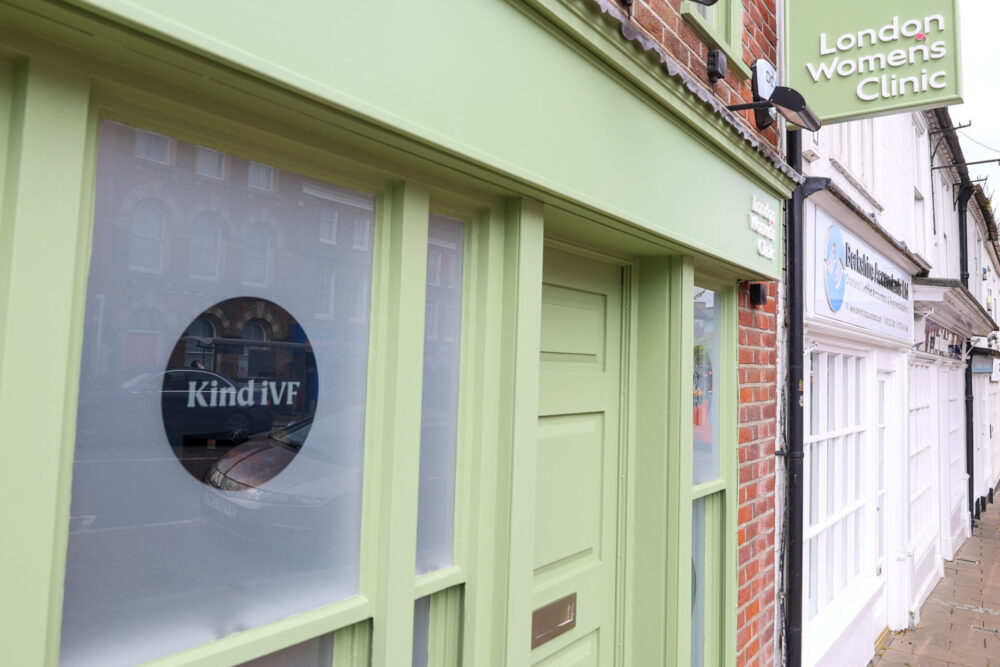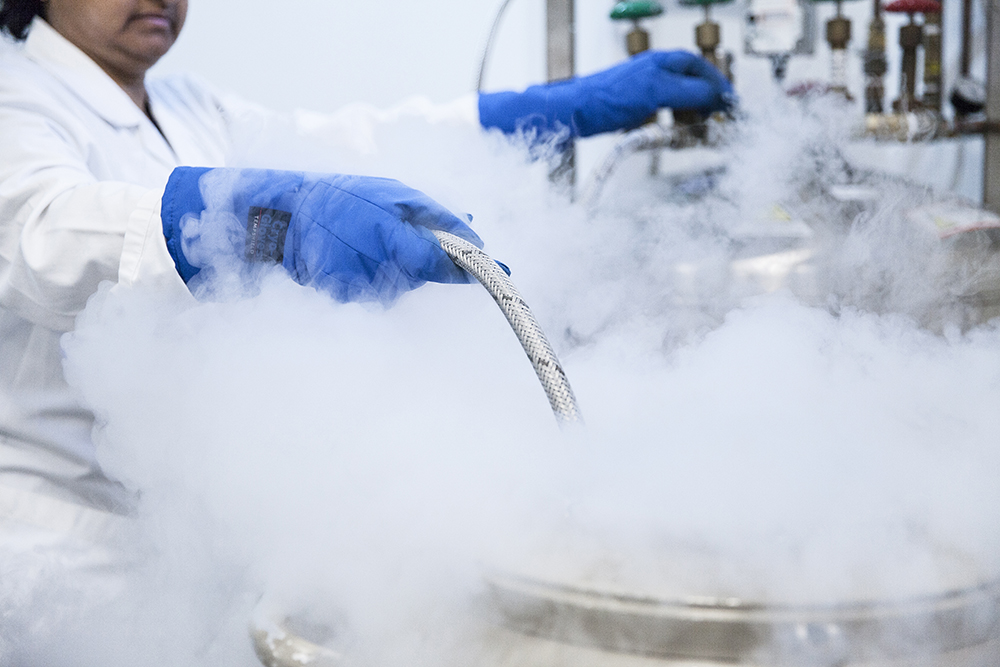BLOG
Your Complete IVF Guide: Process, Success Rates & Cost
Advice, Fertility, IVF
Share this:
All of our blog posts are written, edited, or produced by the Kind iVF Content Team. This is a collaboration between our expert writers, health editors, and the leading researchers and senior doctors at our clinics across the UK.
If starting a family through fertility treatment is on your mind, you likely have questions about what IVF is and how it works. Our guide walks you through the IVF process, success rates, costs and eligibility criteria. We’ll also explore NHS versus private options, including what you can expect from Kind iVF as you take steps towards growing your family.
What is IVF?
IVF or in vitro fertilisation, is a widely used fertility treatment that has helped individuals and couples conceive a child. The process involves collecting eggs from the ovaries, fertilising them with sperm in a laboratory, and transferring a healthy embryo into the uterus.
IVF can be used to treat various fertility issues, including blocked fallopian tubes, low sperm count, unexplained infertility and age-related fertility decline. The embryos are carefully monitored before transfer to increase the chances of a successful pregnancy.
The procedure gives hope to individuals and couples who may be struggling with various fertility challenges, offering a scientifically proven path to parenthood.
How Does IVF Work? Understanding the Process
The IVF process typically takes between 3 to 6 weeks to complete and involves several carefully coordinated steps. Understanding each stage can help you feel more prepared and confident as you begin your fertility journey.
Step 1: Ovarian Stimulation
Hormonal injections are used to encourage the ovaries to produce multiple, mature eggs in ready for treatment. This typically takes 10-20 days.
During which you’ll have two to three monitoring ultrasound scans to track your progress.
Step 2: Egg Collection
Once you have enough follicles, you’ll take what’s called a trigger shot injection at a specific time to induce ovulation. 36 hours later, you’ll have your egg collection procedure. This takes around 20 minutes and is done while you’re comfortably sedated.
Step 3: Embryology
Sperm samples will be carefully prepared in the lab for fertilisation and mixed with the collected eggs by one of our expert Embryologists. This creates embryos, which are then placed in highly specialised incubators for monitoring. At Kind IVF, we also use time-lapse imaging technology to closely observe embryo development, helping our Embryologists to select the best ones for transfer.
Step 4: Embryo Transfer
The embryologist will select the best quality embryo and then your doctor will transfer it into the uterus. This is considered a quick and painless procedure.
Step 5: Pregnancy Test
Following your embyro transfer, you’ll wait 10-12 days after your embryo transfer procedure you will take a urine pregnancy test. This is known as the ‘two week wait’.
Why not read our detailed guide on how to prepare for you IVF consultation?
Who Can Have IVF? Understanding Eligibility
The suitability for IVF depends on various factors, and eligibility criteria can differ between NHS and private treatment options.
NHS IVF Eligibility
The NHS provides IVF treatment to eligible patients, but eligibility criteria can vary depending on where you live in the UK. If you’re considering this route, it’s important to be aware of the typical requirements that could affect your access to NHS-funded treatment:
- Age limit: Most NHS regions only fund treatments for women under 40, with limited cycles for women aged 40 to 42.
- BMI (Body Mass Index): Many regions require a BMI usually between 19 and 30.
- Parenthood status: NHS IVF funding is usually reserved for those without existing children from current or previous relationships.
- Smoking status: NHS IVF is not available to couples where either partner smokes.
- Residency and Citizenship: Generally, applicants must be permanent UK residents and have lived in the country for a minimum of 12 months.
- Exceptional circumstances: Personal medical conditions are taken into account; however, in certain cases, they may not confirm with the standard eligibility criteria.
However, NHS-funded IVF cycles have decreased significantly, falling from 35% in 2019 to just 27% across the UK in 2023. Many areas have additional criteria such as age limits, BMI requirements, and restrictions based on existing children.
Private IVF Options
Private fertility treatment offers more flexibility and often shorter waiting times. Many people choose private IVF when they don’t meet NHS criteria or prefer not to wait for NHS treatment, like our patient Doll said in their Trustpilot review:
“Absolutely fantastic from my first appt to now – my treatment is ongoing. Been an NHS worker myself for the last 17 years the difference in going private is outstanding. No waiting around they have my time to explain things to you.”
At Kind IVF, the focus is on providing accessible, high-quality care with eligibility criteria designed to support your chances of success as you go through your IVF process.
Kind IVF eligibility criteria include:
- Being under 37 years old
- Having a BMI under 30
- Having good/normal ovarian reserve
IVF Success Rates: What to Expect
Understanding success rates can help you make informed decisions about your treatment. It’s important to remember that success rates vary significantly based on several factors, with age being one of the most significant.
Kind iVF Success Rates
At Kind IVF, 69% of patients achieved a clinical pregnancy after cumulative embryo transfer(s), with pregnancy confirmed via ultrasound scan at 7 weeks*. These results reflect the high standard of care and advanced technology available through the programme.
*Confirmation of pregnancy via ultrasound scan at 7 weeks. Cumulative clinical pregnancy rate after embryo transfer (392 out of 567), October 2022 – April 2025. Inclusive of multiple egg collections, and fresh and frozen transfers.
View our success rates here for detailed statistics or to compare national averages check out the HFEA.
NHS vs Private IVF: What’s the Difference?
When deciding between NHS or private IVF, it’s important to weigh up the differences:
- NHS IVF: Limited availability. Criteria and waiting lists vary by region. Visit IVF – NHS for full guidance.
- Private IVF (e.g. Kind IVF): Greater flexibility, faster access, advanced treatment options, and personalised care plans.
At Kind IVF, we prioritise patient-first care—combining affordability, advanced technology and compassionate support to make your fertility journey as smooth as possible.
Find out more here about why many have chosen Kind iVF over taking the NHS route.
How Much Does IVF Cost?
The cost of IVF treatment varies significantly depending on whether you choose NHS or private treatment and which clinic you select. For instance, with the NHS, the cost varies as it is dependent on local policies and patients can unfortunately face unexpected expenses that aren’t covered by funding.
Kind iVF Pricing
Kind iVF has been specifically designed to provide affordable, high-quality fertility treatment.
At £2950, our comprehensive package ensures there are no hidden costs, allowing you to focus on your treatment with confidence.
You can learn in more detail about what Kind iVF includes in our packages here.
We know that every fertility journey is unique, which is why we also offer tailored options like ICSI and Donor IVF—ideal for those who need a little extra support to grow their family.
- Kind ICSI includes everything in the Kind IVF package plus ICSI (Intracytoplasmic Sperm Injection), specifically designed for couples facing male fertility challenges.
- Kind Donor IVF includes the full Kind IVF package plus a vial of donor sperm from London Sperm Bank and additional counselling support.
Each pathway is designed with care to help you feel supported and secure.
Taking Your Next Steps for Affordable IVF
Whether you are still researching the IVF process or are ready to begin, taking that first step can feel pretty daunting. At Kind iVF, we are here every step of the way for every kind of family. With our expert yet caring, patient-first approach, you know you’ll be in good hands no matter how many questions you have or what your individual path to parenthood looks like.
Starting fertility treatment is a big decision and we’re here to support you with clear information and no-pressure guidance.
• Book a consultation with our fertility experts to explore your options.
• Reach out to our team with any questions—online, by phone or in person.
• Join one of our open day events to get a feel for our clinics and meet the team.
Whether you’re gathering information or feel ready to book, we’ll help you move forward at your pace, with clarity and confidence through your personal IVF process.
References:
https://www.hfea.gov.uk/about-us/media-centre/key-facts-and-statistics
Share this:



